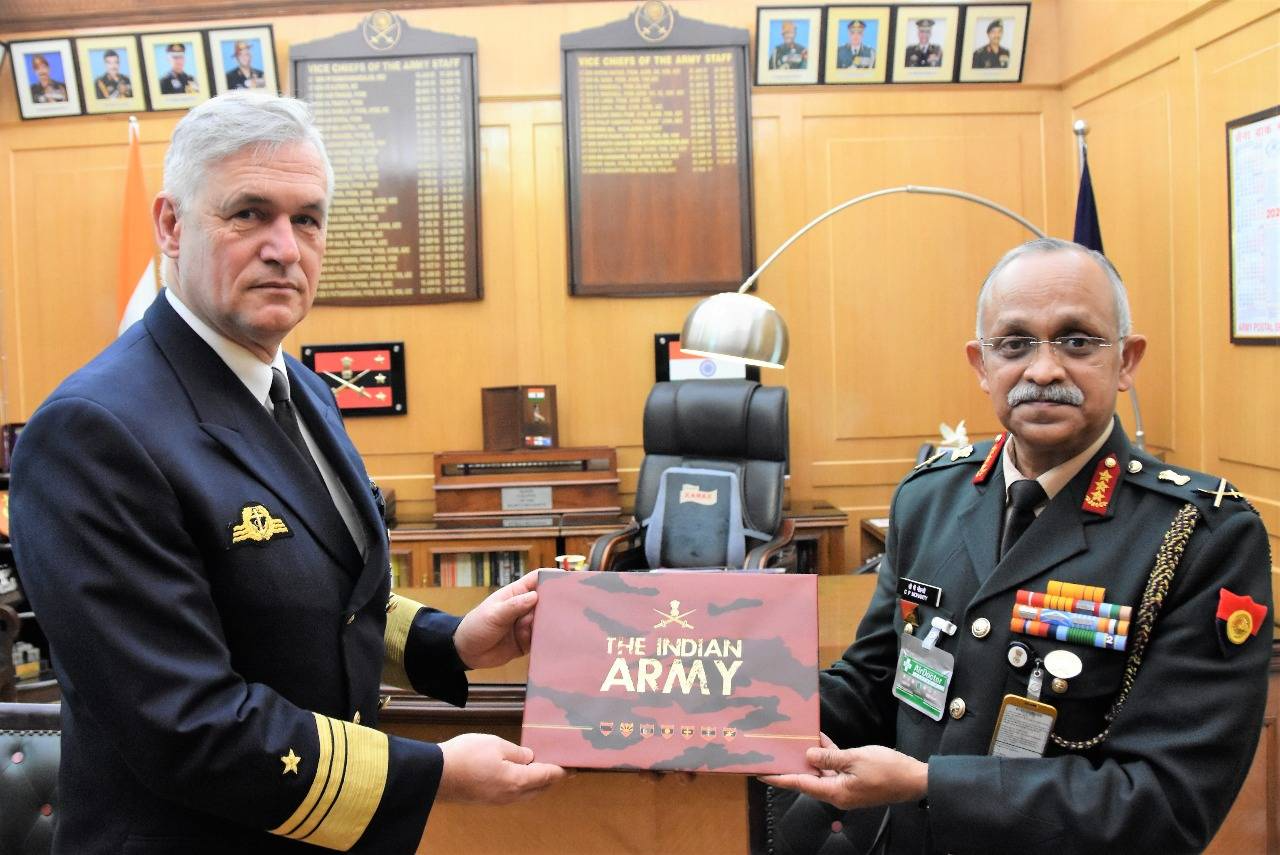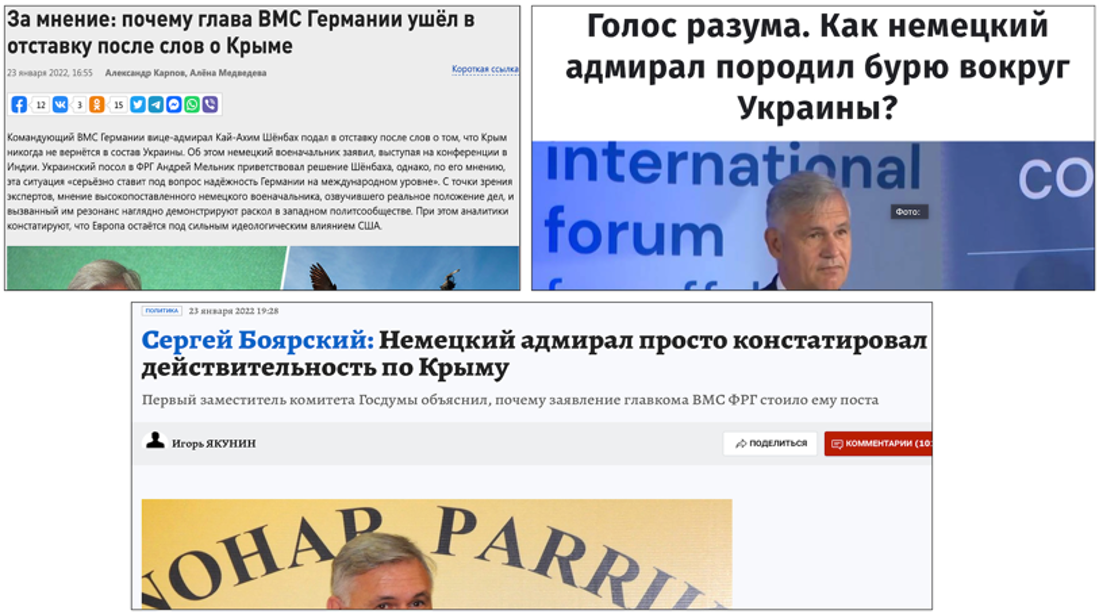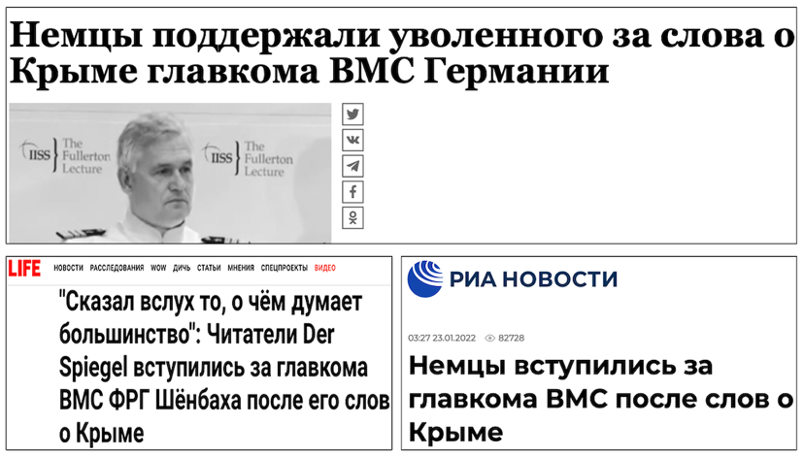Kremlin outlets exploit suspicious user comments on German Navy chief’s resignation
Outlets cited suspicious comments giving the impression they represented broader German public opinion.
Kremlin outlets exploit suspicious user comments on German Navy chief’s resignation
Share this story

BANNER: Then-German Navy Chief Kay-Achim Schönbach (left) visits Lieutenant General Chandi Prasad Mohanty (right) during his January 2022 visit to New Delhi, India. Schönbach resigned on January 22, after arguing at an event during his visit that Putin deserves respect and Kyiv will never win back annexed Crimea. (Source: EYEPRESS via Reuters Connect)
Following the January 22, 2022 resignation of German Navy chief Kay-Achim Schönbach over controversial remarks he made about Russia and Ukraine, Kremlin-aligned online outlets exploited the incident to influence public opinion by citing suspicious online comments, claiming they belonged to German readers who supported the former Navy chief’s position.
Amid increasing tensions between Russia and the West, Schönbach resigned after publicly stating that Ukraine would never get Crimea back and that Russian President Vladimir Putin “deserved respect.” He continued by saying it would be preferable for the West to partner with Russia to counter China’s influence. “Having this big country, even if it is not a democracy, as a bilateral partner … probably keeps Russia away from China,” he said.
Schönbach later tweeted that the remarks reflected his personal opinion. A Defense Ministry spokesperson said the statements “in no way correspond to the position of the Federal Ministry of Defense.” Ukraine summoned the German ambassador to Kyiv to protest Schönbach’s remarks.
Both Kremlin-owned media and pro-Kremlin online outlets exploited the incident, insisting that Schönbach’s remarks simply reflected reality. “The statements made by the military leader deserve attention, because they are not only a rare manifestation of sincerity, but also an adequate perception of reality on the part of the elites of Western countries,” Russkaya Planeta wrote.
In an interview with Komsomol’skaya Pravda, State Duma member Sergei Boyarsky speculated that Schönbach’s resignation was a result of US pressure on Germany, and mocked Ukraine as having nothing to do with the resignation because it is not an independent state. “For the German leadership, the opinions of Washington are most important,” he said. “Ukraine, alas, is not an independent state. And therefore, its current leadership is unlikely to have the right to an independent voice at least on any significant issues. Especially in ones like this one.”

Notably, the DFRLab observed Pro-Kremlin outlets including life.ru, RIA Novosti, and Vzglyad reporting that ordinary Germans support Schönbach’s statements. These articles cite “[online] comments by German readers” as the basis for their stories. This appears to be a Russian influence tactic previously documented by Cardiff University researchers in 2021, in which they reported pro-Kremlin trolls had attempted to influence public opinion by leaving comments in support of the Kremlin interests under Western news articles. These comments were then cited by Russian media to give the impression they represented German public opinion.
In the latest case, pro-Kremlin outlets cited the comment section of the German outlet Der Spiegel. They referenced usernames like “Partytime” and “Bbz,” presenting them as ordinary Germans without further elaboration. In some instances, the outlets did not even provide the names of specific users while allegedly citing them, referring to them vaguely as “other users.”

Among the alleged comments cited:
“Is this true (the words of the Vice Admiral. — Ed.), or Ukraine believes that Russia will return Crimea back. In the same way, Israel will not return the Golan Heights. Ukraine is inflating the situation and trying to drag Germany into the crisis in order to stop Nord Stream 2, — stated user Bbz.”
“If Ukraine really applies for NATO membership, then Germany, of course, should say no. We have enough fake friends, — Partytime expressed their opinion.”
“Whether Ukraine likes it or not, Crimea is gone, it is Russian, the admiral is right and speaks the truth, — concluded another user.”

To track the sources of the comments cited, the DFRLab identified five separate Der Spiegel articles published between Schönbach’s resignation and the Russian articles citing them. In theory, commenters cited by the Russian outlets — “Bbz” and “Partytime,” for example — would have commented on one of these five articles.
The DFRLab aggregated the comment sections of each Der Spiegel article relating to the resignation, collecting a total of 13,628 comments from 3,528 unique users across the five articles. Though comments from both “Bbz” and “Partytime” were recovered in the dataset, the language attributed to Bbz by Russian outlets was not found among the user’s 14 replies to the articles. The quotation from “Partytime” was traced to the article, “Ukraine wirft Deutschland vor, Putin zu »ermutigen«” (“Ukraine accuses Germany of ‘encouraging’ Putin”).

To track the sources of the comments cited, the DFRLab identified five separate Der Spiegel articles published between Schönbach’s resignation and the Russian articles citing them. In theory, commenters cited by the Russian outlets — “Bbz” and “Partytime,” for example — would have commented on one of these five articles.
The DFRLab aggregated the comment sections of each Der Spiegel article relating to the resignation, collecting a total of 13,628 comments from 3,528 unique users across the five articles. Though comments from both “Bbz” and “Partytime” were recovered in the dataset, the language attributed to Bbz by Russian outlets was not found among the user’s 14 replies to the articles. The quotation from “Partytime” was traced to the article, “Ukraine wirft Deutschland vor, Putin zu »ermutigen«” (“Ukraine accuses Germany of ‘encouraging’ Putin”).
Cite this case study:
Eto Buziashvili and Max Rizzuto, “Kremlin outlets exploit suspicious user comments on German Navy chief’s resignation,” Digital Forensic Research Lab (DFRLab), February 4, 2022, https://medium.com/dfrlab/kremlin-outlets-exploit-suspicious-user-comments-on-german-navy-chiefs-resignation-492c4ab4098b.

